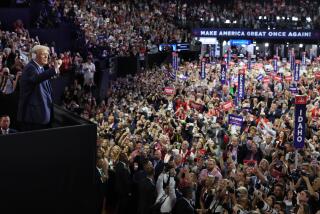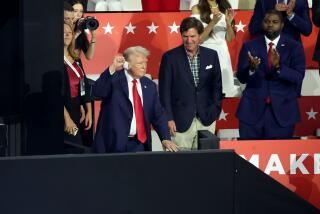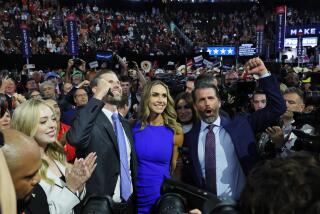Trump gives up on GOP convention plan

- Share via
WASHINGTON — President Trump, citing safety concerns during the COVID-19 pandemic, abruptly canceled the “big crowded” portion of the Republican National Convention that had been scheduled for Jacksonville, Fla., in late August, reversing his insistence on a high-profile speech to a full arena.
Instead, the party will hold official business in North Carolina — perhaps just one day, Trump indicated — with a skeletal group of attendees. Other festivities, including Trump’s nominating speech, will move online, much as Democrats have planned, although Trump made clear that the party does not yet have a plan for what it will do.
“I have to protect the American people,” Trump said, reading from a prepared statement.
A few minutes later, answering questions from reporters, he offered what was perhaps a more candid assessment: “I could see the media saying, ‘Oh, this is very unsafe.’ I don’t want to be in that position,” he said.
Florida has become one of the country’s worst hot spots for the virus, reporting more than 10,000 new cases Thursday, bringing its total to nearly 400,000. The state’s deaths, now more than 5,500 according to the health department, have also been increasing.
The lack of the traditional election season rituals this year for the two major political parties marks another major shift wrought by a pandemic that has upended nearly every aspect of American life.
Trump was vague about what would replace the convention. “We’ll have a very nice something,” he said.
And he made clear his disappointment: “There can be nothing like having 25,000 people,” he said.
Trump’s reversal, after weeks of insisting on an in-person convention, appeared to catch campaign officials by surprise. Almost an hour passed before they issued a statement praising the decision.
Just Thursday morning, California delegates received their instructions on when to arrive in Jacksonville.
Although Trump insisted that the convention could have gone ahead as planned, it was already facing multiple problems. Many delegates had expressed reluctance to go, fundraising had been a challenge, and some high-profile Republican officials had not committed to attending.
Senate Majority Leader Mitch McConnell (R-Ky.) had called the convention plans a “challenging” situation, putting off a decision on whether he would attend. More than half a dozen of his Republican colleagues, including several of the chamber’s oldest members, had already said they would not go.
As Florida’s caseload rose in recent days, party and campaign officials expressed increasing concern on conference calls about following through with the Jacksonville events, according to a person involved in planning the convention who spoke on condition of anonymity.
Officials worried not just about their own health — roughly half of the more than 150 RNC members were unlikely to attend, the person said — but also about the likelihood that Democrats would benefit politically from the juxtaposition of the two back-to-back events, showcasing them as cautious and the GOP as insisting on going ahead with a potentially risky event.
Trump did not mention those problems, but said he needed to set an example for the public, noting that health officials have been telling Americans to stay away from crowded facilities.
“There’s nothing more crowded than a convention … and even though you try to keep people away from each other, it’s just not that kind of a thing,” he said.
That, of course, was precisely the argument that North Carolina officials made last month when they insisted on health precautions in Charlotte, where Trump was originally scheduled to hold his convention. The president rejected those restrictions and, citing frustration with North Carolina Gov. Roy Cooper, a Democrat, announced that he would pull the main convention events out of the state and move them to Jacksonville.
Since then, aides have scrambled to come up with a plan to meet the president’s wishes, including the possibility of holding convention sessions in an outdoor stadium, despite Florida’s summer heat and risk of storms.
Democrats had already announced a scaled-back convention set for earlier in August; it had initially been scheduled for July in Milwaukee.
The loss of a large-scale convention is a much bigger letdown for Trump, who delights in adoring crowds, seeing their enthusiasm as a prime source of power for his campaign. The cancellation is also a blow to his insistence that the country is getting back to business as usual and that the virus itself is down to “embers.”
In announcing the decision from the White House, Trump insisted that Florida’s problems were isolated, and that his political advisors told him they could still stage a big event with a “tremendous list of speakers” and a long waiting list of attendees.
But Trump’s attempts to return to the campaign trail have been troubled. His first rally since the pandemic shutdown, in Tulsa, Okla., last month, suffered from low attendance and some reports of viral spread among attendees. He had to cancel a subsequent rally scheduled for earlier this month in Portsmouth, N.H.; aides insisted that bad weather was to blame.
Trump’s reluctant decision to scrap most of the festivities is the latest sign that he is accepting, at least for now, that the virus is fundamentally changing American life and that the risk of spread needs to be taken more seriously. This week, he posted a picture of himself on Twitter wearing a mask and has begun telling Americans to follow suit, though he did not wear one during Thursday’s briefing.
Jacksonville Mayor Lenny Curry, a Republican who was on the host committee, had voiced concerns this week about hosting the convention, echoing the county sheriff, Mike Williams, who said he was worried he lacked the resources to ensure safety and security, given the short notice and rapid spread of the virus in the region.
Curry and Williams released a statement thanking Trump after Thursday’s announcement “for considering our public health and safety concerns in making this incredibly difficult decision.”
As GOP officials scrambled in recent weeks to come up with a workable plan, the Republican National Committee had announced plans to limit the number of people in event venues and deny access to guests brought by delegates and alternates, another frustration for would-be attendees.
Many delegates were reluctant to come to Jacksonville for a variety of reasons, the person involved in planning said, raising the prospect that Trump might not have gotten the large crowd he sought.
Hotels, the person said, were only offering discounted rates for four-night stays, but many delegates wanted to stay in Jacksonville for only two nights, minimizing their exposure.
Some delegates, however, said they were eager to attend.
Jennifer Beall, a 57-year-old delegate from Rancho Santa Margarita who has a heart condition, said despite the risks, “I was going to go no matter what.”
“I’m a huge supporter” of Trump’s, she said. “I would have been there because my commitment to his reelection is that strong.”
“My kids do get worried about me,” she added. “They’re going to be so relieved that I’m not going to be down there.”
Times Staff Writer Seema Mehta in Los Angeles contributed to this report.
More to Read
Get the L.A. Times Politics newsletter
Deeply reported insights into legislation, politics and policy from Sacramento, Washington and beyond. In your inbox three times per week.
You may occasionally receive promotional content from the Los Angeles Times.












